Police Story, Police Story 2, Police Story 3: Supercop, Police Story 4: First Strike (1986, 1988, 1992, 1996, 2004)
Directed by: Benny Chan, Jackie Chan, Stanley Tong
Written by: Edward Tang, Elliot Tong, Fibe Ma, Greg Mellott, Yee Lee Wai
Starring: Jackie Chan, Jackson Liu, Maggie Chung, Michelle Yeoh, Nicholas Tse
I have loved the incredible entertainer, martial arts master and foolhardy nutcase that is Jackie Chan since first playing a hired out video of The Big Brawl [I know, I know, but it’s not that bad] about twenty five years ago, and you can find my reviews of The Young Master, Mr Nice Guy and Shaolin elsewhere on this site, but here I am going to explore his Police Story franchise, which combine amazing fight scenes, incredible stunts and slapstick comedy to often exhilarating effect. These analayses are based on the original Hong Kong versions of the films. However, since the films exist in multiple, often heavily altered versions, and in two cases the original cuts are not widely available, I shall look a brief look a some of these different edits, and the best version to buy, at the end of this article to avoid clogging up the reviews too much.
The Royal Hong Kong Police Force plans a major undercover sting to arrest crime lord Chu Tao. Inspector Chan Ka-Kui is part of the operation, along with undercover officers stationed in a shanty town. However, the criminals spot the police and the ensuing car chase cuts through the hillside shanty town. Ka-Kui follows on foot as the drug lord attempts to escape in a double-decker bus. He arrests Tao, but is reprimanded by Superintendent Li for letting the operation get out of hand. His next assignment is to protect Tao’s secretary, Selina Fong, who plans to testify in court about Chu Tao’s illegal activities….
Many Jackie Chan fans would claim Police Story, which mixes cop thriller, martial arts and comedy, as his best work, and the man himself would agree. Me?…..well, I’m a big fan of the film, but I personally think four or five other of his other movies just top it, including the first sequel Police Story 2. Controversial? Well, this is Dr Lenera you’re reading, the fool who prefers Batman And Robin to The Dark Knight. Every time I watch Police Story, I am blown away by the incredible action and laugh at the comedy, but something about it makes me say to myself: “hummm…this is very good, but it has its flaws that I can almost, but not quite, overlook”. Its pacing is a little off, sagging badly in the middle as a lot of Chan’s self-directed projects do, and the opening and ending are so great that the rest of the film suffers a bit by comparison. Don’t get me wrong, it’s still a classic, but maybe one that’s a tad overrated. Of course it still has some of Chan’s best work, and might be the best film to see to get an overview of his abilities. When Chan finally broke into the US box office with Rumble In The Bronx in 1997, he stunned audiences and critics….but he would done have stunned them even more if he had done it in 1985, where he was at the peak of his skills.
This film came about because in 1985 Chan made an American cop thriller called The Protector, which could have almost starred anyone as it failed to allow Chan to do what he does best. Chan disliked it so much he heavily re-edited it, cutting, altering and adding scenes, for its Hong Kong release, then hit upon the idea of doing a cop thriller his way the following year. Given the generic title Police Story so it was harder for producers to rush out cheap copies before its release as they often did of his films, it was called Glass Story by the crew because of the amount of glass shattered, and it wasn’t ordinary stunt glass but ‘sugar glass’, which looked more realistic but caused more injuries. Police Story sure was a dangerous production; Chan got burns on his hands during the slide down a pole because they plugged the wrong lights in, and also broke two vertebrae and dislocated his pelvis when he crashed through the glass and light display, while many others, including Maggie Cheung who got kicked down some stairs, were badly injured throughout, something Chan wanted to show more of on the outtakes, but was over-ruled. The film was a smash at the Hong Kong box office, and video releases in the west increased Chan’s cult following. Bits and pieces from Police Story started to find themselves in films like Rapid Fire, Tango And Cash,and Bad Boys 2.
Police Story has beginning and end sequences which are amongst the top five in action cinema. FACT! We open with a police operation to catch Chu Tao the drug lord, and when it starts to go wrong we have an intense shootout, than the cops drive through a shanty town, pretty much destroying it [don’t worry, it was scheduled for demolition anyway]. It’s not over though, because the crooks get on a bus, so what does Chan do? He hooks an umbrella on to the back of the bus and hangs on for dear life, then….he is knocked off and takes a short cut so he can then stand in the bus’s way, the driver breaks, and, in a shot which always gobsmacks me, you can actually see a load of stuntmen crashing through the front window on to the road below. This really is film-making on the edge [actually the driver broke too early so the stuntmen missed hitting their safety cushions], fearless, dangerous but thrilling, and it’s matched by the climax, where for ten minutes Chan battles the baddies in a shopping mall, a brilliant, intense ballet. Stunt people fly everywhere, glass is endlessly shattered, stunning martial arts is mixed with plain old brawling, all the props you can find are put to good use, and it all finishes with that pole stunt, which Chan, of course, shows three times. Phew!
After all this, it’s understandable why the rest of Police Story has serious trouble matching the bookending scenes. If you remove those there isn’t really that much action; two brief but undoubtedly exciting martial arts battles, the first of which has a simply amazing bit where Chan jumps into a car windscreen both feet first, kicking the man inside, and a small amount of chasing. Chan obviously spent so much time perfecting the action scenes he did have that his films often have less fighting than many other Hong Kong films. They also take up some of the rest of the time with extended comedy sequences. These scenes often slow the pace down considerably, but Police Story has much which always makes me laugh, from Chan having to answer several telephones all at once, to a riotous courtroom scene where Ka-Kui thinks he is playing a tape recording of Selina describing her boss’s criminal activities but the wily moll has actually recorded her flirting with Chan [much sexual innuendo here!] and the poor policeman looks like an idiot, not to mention his girlfriend May.
Chan tended to play virtually the same character is many of his films, and the Police Story films are no exception, though in this first film he has a slightly harder edge to him. He’s a modest policeman who always tries to do the right thing, but here he is willing to seriously break the law, like taking his boss hostage, and he really looks like he could ‘lose it’ and go off the rails. Of course he also happens to have amazing fighting skills and doesn’t think twice about risking his life, but is just as likely to succumb to a birthday cake in the face from the long-suffering May as fall off something. Their relationship seems very fraught but is mostly handled humorously, while writer Edward Tang nicely makes us understand both viewpoints. The plot is reasonably decent though it noticeably seems to be struggling around the middle. As with many of Chan’s movies, the writer would think up the basic story, Chan would describe the various action and comedy scenes he wanted, than the writer would go off and write his screenplay, making sure he incorporated the things Chan wanted.
Chan really is at the top of his game here; his physical prowess is miraculous, his choreography astounding, and his comedic timing astute. He was never a great actor, and never will be, but his combination of mugging and intense looks serves his character perfectly. Cute, adorable Maggie Chung and exotic, dangerous Brigitte Lin [usually in period movies] are a nicely contrasting pair of leading ladies. Chung would return, as would Bill Tung as Chan’s somewhat bumbling but wisecracking boss. He and Chan actually have more chemistry than Chan and Chung do. The score by Michael Lai and Tang Siu Lam is mostly based on one main theme, varied to emphasise either tension or comedy. It’s a catchy theme that Chan sings, [with words that are all about heroism], over the outtakes during the end credits. The thing about Police Story is that it really does contain much of the World’s Greatest Action Star’s best work, even if the film itself could have done with a bit of tweaking here and there.
Inspector Chan Ka-Kui has been demoted to highway patrol as the result of his handling of his previous case, which involved the violent arrest of crime lord Chu Tao and heavy property damage. This pleases his girlfriend, May, who is glad that her boyfriend is no longer taking difficult cases and has more time to see her. However, Chu Tao is terminally ill and therefore out of prison. He vows to make life hard for Ka-Kui and threatens not only him but May. When Ka-Kui fight his men at a restaurant after May has been hit, he is ashamed of his behaviour and resigns from the Royal Hong Kong Police Force. He plans to take a trip to Bali with May, but it seems that he could be needed to deal with a series of bomb threats…..
So, contrary to the general opinion, I’m going to make a claim for Police Story 2 as being better than the first movie and the best of the series. It doesn’t have the incredible beginning and ending that it has, but it’s better paced, better structured, has a stronger plot, is more intense and has some real emotional involvement. It’s just a better film overall, and a prime example of a sequel that both gives fans of the first movie more of the same as well as tweaking things a little. It develops characters and threads from the proceeding picture, and, while it still contains much comedy, slightly reduces the amount of it, better paces it throughout the film in relationship to the story and the acting, and is overall considerably darker. Ka-Kui really goes through hell in this film, and though there is the semblance of a happy ending, it really does leave one with the impression that the central couple can never really be happy. In short, it’s a more mature film and definitely one of Chan’s best [if not quite up there with his top two or three].
Chan followed the huge success of Police Story with Armour Of God [famous as the film in which he had his worst injury, cracking open his skull when he miscalculated a jump], Project A Part 2 and Dragon’s Forever. Though it would be a while before he would really crack Hollywood, this really was the golden period of Chan’s career, full of incredible invention and danger. Dragon’s Forever was sadly a commercial failure, so Chan decided to return to the police force in the second half of 1988. Much of the same crew returned, in fact Chan often made movies with the same crew, and the eagle-eyed can spot many of the same guys turning up to fight Chan in film after film. Again, Chan was badly injured when he jumped through a window of real glass rather than one with fake glass next to it, and was almost killed when a car pushed him ten feet down the street. They were filming a bit when Chan had to run across a road, and they didn’t get permission to stop the traffic, so they just went ahead and did it anyway. Welcome to Hong Kong filmmaking! Meanwhile Maggie Chung split her head open after being hit by falling metal frames, requiring the script to be altered while she was in hospital. Police Story 2 took Chan back up to the top of the Asian box office charts.
So the first film hurls you into the action with a sustained set-piece that never seems to stop. Chan and his writer Edward Tang obviously realised they couldn’t top it, so they open the film with Ka-Kui directing traffic having been demoted, then gradually build up to the first action scene as Chu’s right-hand man John Ko and his lackeys annoy Ka-Kui and May in increasing amounts until Ka-Kui flips. The story than brings in the thread about the bombers, and it could seem like we are watching two films at once, one a tense but fairly conventional cop thriller about the hunt for a group of blackmailing bombers who have no bones about carrying out their threats [some seriously cool explosions here, but maybe I’m saying that because of all the crappy CG ones I have to suffer through in films these days?], and one a more personal and intense one in which a poor policeman’s relationship with the girl he loves is ruined by the consequences of his job. However, it somehow manages to not seem like two films, just one with a lot going on. Of course it does all link up properly with Ka-Kui being used by the bombers, who have May kidnapped, to pick up their ransom demand with a bomb strapped to his chest. The scene where the bad guys mockingly read out a letter from May to Ka-Kui that he had not read, in front of them, is an unusually emotional one for a Jackie Chan film.
Police Story 2 shows us a very sad and honest portrayal of a couple who can never be happy because of the man’s job. Whenever Ka-Kui tries to escape to some peace and quiet and by extension be happy with May, circumstances, whether organised or not, always bring him back to fighting crime and putting her in danger. The ending has the two admire the fireworks set off in the final explosion, but I certainly don’t think they have much of a future together. A shame this sub-plot was minimised in the third film, as it really gave a personal dimension to the proceedings. Of course this is a Jackie Chan film so you still get your share of action. Actually, there is less of it than in part one, but it feels like there is more because it’s better spaced out through the film and the story moves faster. The first fight where Ka-Kui battles a few of Ko’s men is a little brief, and it’s notable how Chan is a little bit less intense in his fighting than before, but a battle with a larger group of henchmen [who, of course, mange to suddenly produce metal bars from nowhere] in a playground is a simply stunning display of martial arts techniques and how human beings can fall in different ways. The final showdown in a fireworks factory, in which Chan’s bodyguard Ken Lo [not for the last time] takes part is decent, but it’s less for the fighting than for the crazy stunts like Chan having a bomb thrown between his legs to explode on the ground while he hangs from a chute, to Maggie Chung being visibly knocked over by those metal frames. Though my favourite bit in the film is Chan’s method of crossing a road. Normal people wait for a green light. Chan stands on a balcony, then jumps onto a truck going one way, then a double-decker bus going the other way, then dodges two outcropping signs before jumping through a window.
The story, which [perhaps due to criticism?] makes Ka-Kui more a part of a team in a section where they are trying to find and track the bombers], throws up the odd surprise. In a film which sometimes looks really good visually, like the almost soft-focus and lushly coloured night-time scenes with Ka-Kui and May, there is an almost pitch black bit where Ka-Kui and a partner are in a warehouse and see a suspect light up by a light in the distance. He turns out to be deaf and dumb, but certainly not harmless when he suddenly turns violent, quickly bests the two of them and escapes. Later on, in the final fight, Ka-Kui is clearly no match for him martial arts-wise, barely getting a blow in, so he resorts to almost ‘cheating’ and throwing at him the same kind of small fire bombs that he had earlier tortured him with when he was tied up. Ka-Kui even almost kills a terminally ill man, even if he is Chu-Tao[ the bit before this is another sequence of Chan magic, where he makes breaking into a house via loads of climbing and jumping look so easy]. It’s a measure of the film’s success that the comedy doesn’t really jar with the serious elements. My favourite bit is, after a really cheap fart joke, May and Ka-Kui row and the argument passes through a men’s locker room and into a toilet where Ka-Kui’s boss Uncle Bill is sitting. The scenes between Bill and his by-the-book boss Superintendent Raymond Li improve on the ones in the first film and sparkle with chemistry, timing and wit. We get a real idea of their relationship.
Chan really seems to develop as a director in this film, which looks far handsomer than its predecessor, and flows a lot better, even during some not entirely necessary bits around the middle where Ka-Kui is not centre-stage involving the surveillance team, which almost slow the pace down but don’t quite succeed. Chan seems awkward in a silly bit where Ka-Kui, disguised with just a moustache, impersonates a buyer of explosions, but otherwise is at his best and certainly handles the emotional side of the film well. Cheung Yiu-Cho is credited with the score, and it’s both reasonably exciting and manages a few decent themes including a pretty one for Ka-Kui and May, but some cues from Police Story are inserted, and the difference in arrangement [the earlier tracks have a ‘harder’ sound] jars a little. As before, Chan sings the theme song, though it comes across as a lesser variant of his classic song for the earlier film. Generally Police Story 2 demolishes the myth that sequels are never as good as an original movie, though it’s a myth I’ve never believed in anyway. It’s a cracking action thriller and a fine film all-round as well as being a great showcase for the legend that is Jackie Chan.
Inspector Chan Ka-Kui, now considered a ‘Supercop’ by his superiors, is sent on a secret mission to mainland China where he is introduced to the military police force’s Interpol director, Jessica Yang, who tells him that the target of the mission is a drug lord named Chaibat. In order to infiltrate Chaibat’s Triad organization, the plan is to get close to Chaibat’s henchman Panther, who is being held in a Chinese prison labour camp in Canton. Ka-Kui, posing as a petty criminal, is able to help Panther escape with the aid of Chinese military police, who eliminate Panther’s men in the prison. Panther then meets up with some of his other men, and Ka-Kui helps them all escape to Hong Kong, where Panther says he has a job for Ka-Kui……
If Police Story 2, despite a few differences, is still overall still quite similar to Police Story and works as a straight continuation of it, Police Story 3: Supercop is really quite different. It takes Ka-Kui out of his Hong Kong stomping ground and puts him in some different locations, thereby giving the film more of an ‘international’ feel. In fact it feels a bit more ‘western’, [something that would increasingly continue in Jackie Chan’s films as he started to ‘break’ into America] with Chan’s ‘mania’ toned down. There are still fighting and comedy scenes, but they are less elaborate. Atoning for this, there is even more of an emphasis on big stunt sequences that may stylistically resemble scenes in big budget Hollywood action sequences but have the important difference that the stars are actually doing their own stunts. Do I think it’s as good as the first two? Not quite, certainly not Police Story 2, and the first three quarters are sometimes uneven and awkwardly plotted, but the final quarter really, to use a term that may sound childish, kicks arse. It may disappointingly tone down the Ka-Kui character, and give him a partner who for once is allowed to match him in every way, but the latter is somewhat refreshing, especially when that partner manages to be the incredible Michelle Yeoh.
After Police Story 2, Chan directed Miracles: The Canton Godfather, which was a film that was close to his heart but flopped, and Operation Condor: Armour Of God 2. Going way over budget with his films, he made the decision to make more films for other directors, albeit usually still with much control. First was Twin Dragons, and second was the third adventure for Ka-Kui in 1992. Stanley Tong had only made one previous film, Stone Age Warriors, but was given a surprising amount of creative control over the project. He rewrote much of Edward Tang’s script, which was originally set in Hong Kong and had Ka-Kui on his own for much of the time as he thwarted some jewel thieves. He also brought back Hong Kong’s top female action star of films like Yes Madam and Magnificent Warriors, who had stopped making films when she got married, but was now divorced. She had actually appeared in a Chan film before, Twinkle Twinkle Lucky Stars, though they did not meet on-screen. This time there were two stars putting their life on the line, though only Chan got seriously hurt when he was knocked unconscious by a helicopter while hanging on to a train. Filmed in Hong Kong, Mainland China and Malaysia, and shot in synch sound [most Hong Kong films up to now had been shot silent because they were always dubbed into various languages including the two main types of Chinese Mandarin and Cantonese], it won Chan the Best Actor Award in Hong Kong, a first for an action star, though it wasn’t quite the smash expected. Four years later, it was released theatrically in the US as Supercop after Chan’s success there with Rumble In The Bronx.
We are re-introduced to Uncle Bill [though not Li this time], and poor May, whom Ka-Kui has to leave, though they do get a brief love scene this time and actually seem to be sleeping with each other, though of course it’s very discreet and played more for comedy. Than Ka-Kui is on his way, and this third instalment takes even longer to get to the action as Ka-Kui prepares for his mission. The first fight is more of a demonstration rather than a battle between Ka-Kui and a villain, as he has a training bout with a guy whilst training for his mission in Shanghai. Then the film becomes a reasonable undercover drama as Ka-Kui infiltrates the villainous gang of drug traffickers. It keeps the attention but is a little lacking in tension and the bursts of action, mostly short fights, one of which has Yeoh’s character actually rescue Chan’s and demonstrate more cool moves than Chan is allowed to do, are disappointingly brief. A bit where Ka-Kui and Panther hang on a cable car between two mountains is sped up to a silly-looking degree [though was probably necessary]. Then mid-way the film almost starts to go off the rails as we are randomly introduced to a load of gangster bosses in Malalsia, and even a rehash of the famous baseball scene from The Untouchables, but this time using…. a pineapple. The plotting is terribly confused here, and though this section culminates in some gunplay and some spectacular pyrotechnics, it’s all a bit of a mess, despite the joy of seeing Chan and Yeoh together in action.
After a Bond-like boat chase, we now relocate to Malaysia’s capital Kuala Lumpur and a complex jailbreak, and suddenly the film really sorts itself out and gradually builds to a mostly incredible series of death-defying action scenes where it really feels like Chan and Yeoh were attempting to out-do each other. Chan jumps onto a ladder connected to a helicopter [only some empty crates and plastic sheets were 100 feet below to break the fall], hangs onto the ladder while being flown around the city, then battles two bad guys atop a train [including Ken Lo again]. Director Tong would sometimes do stunts himself in his films, and joined in here by being the person who crashes the helicopter onto a tunnel; he broke his shin. Meanwhile Yeoh hangs onto the side of a van, falls off it to smash against the windshield of the car behind, then drives a bike onto a train. Neither Chan nor Tong wanted her to do the bike stunt because a stuntman broke his leg doing it, but she did it first time around….though can be seen to careen off the train in the out-takes. This whole twenty minutes is action cinema taken to awe-inspiring heights; exhilarating, thrilling and really foolhardy. And it’s so good that one almost forgets that the actual martial arts fighting, while still very good, is nowhere near to the standard of the astounding displays in the first two films, but this seems to have been a deliberate decision.
The comedy is less slapstick orientated and more based around situation. The two major examples of this are a bit where Ka-Kui is supposed to take Panther to his family and they are all played by cops including Yang and Uncle Bill [Bill Tung, who generally doesn’t get much to do in the picture, enjoying playing in drag here] and a sequence just before the climactic action scenes which brings May back into the picture [and we get to hear Maggie Cheung speak some English too]. She’s a tour guide working in Kuala Lumpur, and sees Ka-Kui with Yang. Ka-Kui doesn’t to be seen, Panther thinks she’s….a prostitute, and it’s all very well worked out until, in a rehash of part of Police Story 2, May gets kidnapped again and Ka-Kui is forced to work for the bad guys. That’s the thing about Police Story 3. Many individual scenes are excellently done but the film and its story just don’t flow too well. It’s also disappointing how the relationship between Ka-Kui and May, dealt with so well in the previous film, is just used as a basis for laughs, but then Ka-Kui isn’t really the same character. Before, he was a simple cop who goes into an almost animalistic rage when faced with danger and whose life just gets worse and worse. Here, he’s just a ‘Super Cop’ who doesn’t even seem that keen on fighting.
Unlike Chan, who tended to make things up as he went along, Tong storyboarded most of the action in the film, though his directorial style is not visibly that different from Chan’s except for more wide-angle shots. Popular Hong Kong movie villain Yuen Wah plays Panther in this film and is a memorably flamboyant villain but doesn’t get much of a good fight with Chan. This film suffers from a rather poor, mostly synthesiser score from Man Chew, Jenny Chinn and Jonathan Lee which rarely seems to make much of an effort to enhance what is happening on-screen. The Chan-sung song at the end is very poor too. I seem to have pointed out many flaws with Police Story 3, but it really soars when Chan and Yeoh are on-screen together, be it barbed banter, battling to see who can do the more dangerous stunt, or Yeoh shooting a load of bad guys as she falls onto Chan, whose hands end up holding her breasts. They are one of the greatest partnerships in action cinema, and it’s a great shame they never did all over again. Though Yeoh’s character the next year in Tong’s Project S, in which Chan,playing Ka-Kui, made a brief appearance.
Inspector Jackie Chan is hired by the CIA to find a Russian woman named Natasha whose boyfriend may be linked to a terrorist organization trying to acquire a nuclear device. He follows her to Ukraine, where he realizes that she had been hiding vital information and gets her arrested, then follows the boyfriend, a nuclear scientist called Tsui, to a restricted area. During a battle between CIA agents together and Ukrainian authorities, Ka-Kui finds a briefcase which contains evidence from Tsui, but loses it in a chase. In Moscow, he is assigned to work with Colonel Gregor to solve a similar case involving nuclear weapons being smuggled out of Ukraine, the suspect being Tsui. He is taken to Brisbane, Australia, where Tsui’s younger sister Annie Tsui works at an aquarium….
Yes, there is a fourth Police Story film, though you may not have known it because this film is called Jackie Chan’s First Strike in most countries outside of Hong Kong. Though I will go briefly into the different versions of the Police Story films at the bottom of this article, I must state right here that Police Story 4: First Strike, was hacked to pieces for western release, losing around a fifth of its running time, meaning that you must see the Hong Kong version to properly appreciate it. Very much Chan’s take on James Bond, it’s even less like the first two films than number three is, though I think it’s a slightly better film than Supercop. The plot is decent, and the action even more diverse, while allowing Chan to do a bit more fighting. My main criticism is that, though this may be the third sequel to Police Story, Chan really isn’t Ka-Kui any more, and not just because, as was becoming the norm around this time, he’s now called Jackie. He’s now also kind of a bumbling, would-be 007 who just about muddles through.
Chan started to slightly diversify his projects, from the goofy City Hunter to the tough Crime Story to the traditional martial arts movie Drunken Master 2 to the western-aimed Rumble In The Bronx to the racing car drama Thunderbolt. Rumble In The Bronx was picked up for US distribution, so the fourth Police Story adventure, again helmed by Stanley Tong, was intended to have even more international appeal. The 1996 movie was filmed in Russia, Ukraine and Australia, and had cast speaking Cantonese, Mandarin, English and Russian. It was almost subtitled Simple Mission, CIA Story and A Piece Of Cake. Maggie Cheung was intended to return as May, but supposedly wanted too much money for two days work. Chan got crunched fingers, several bruises and very nearly a broken nose while filming the major fight scene. The Ukraine-set snow chase was actually filmed at Echo Falls, a ski resort in Australia, but filming was very difficult, with it being almost impossible to stand on the snow due to the cold seeping through the inadequate boots cast and crew were given, and meals taking nearly an hour to be transported to where they were, and always cold, while Chan nearly got hyperthermia from staying in icy water for too long without a coat. Commercially all this was worth it as the film was huge at the Hong Kong box office. In the US, it was released a year to cinemas a year later. It wasn’t the hit expected. Perhaps the horrrendous cutting of the film was one of the reasons.
So, as before, Uncle Bill sends ‘Jackie’ on his mission, and in no time he is in the Ukraine, following a woman and soon getting himself involved in an epic snow action sequence. This part of the film moves so fast it’s easy to miss part of the plot, why this and that is happening, but the snow chase is great, a great variation on a classic Bond-like sequence. Chan snowboards and skis with one ski, but constantly trips and falls in a manner 007 would have been ashamed of, as well as wearing a silly polar bear hat. In fact one of the nicest aspects of this film is the way it plays with Bond things, from Jackie dressing up in a flashy suit that is almost immediately ripped to pieces, to quickly having a cool gadget stepped on after its first use, to quickly getting lost, to getting so confident when following somebody that he starts singing, and is forced to strip at gunpoint, showing his backside to female passersby. This is one of the few comedy scenes in this film; the tone is often light, and most of the action has comical bits and pieces, but overall there are even less jokey sequences than before. This was probably Tong’s influence, who perhaps felt Chan’s humour wouldn’t appeal so much to US audiences.
The snow chase climaxes amazingly with Chan jumping off a cliff onto a helicopter and having his hat demolished by the rota blade. Then we switch briefly to Moscow and then to Brisbane, and the film slumps a little as it sets up the rest of the plot, until we reach almost the half-way mark. Jackie is chased by two giant Russians around the inside and outside of his hotel, and the man still shows that he’s got the ability to clamber over everything in sight, then soon after battles a load of henchmen in what is the major fight scene, for part of it, using a ladder to fend off the baddies with. His dexterity is incredible here, but the sequence lacks the intensity of the fights in the first two Police Story films. As he got older, Chan would get less aggressive in his fighting, reacting and defending rather than engaging and attacking. As with the third film, Police Story 4 has a very extended action climax, with a shoot-out between gangsters, Jackie fighting on stilts, then battling villains underwater in an aquarium containing sharks [three mechanical ones were built, but you can tell the sharks are mostly real]. It’s both hilarious and amusing seeing undersea martial arts fighting, and the sequence is a decent length too. Some find it too long and stupid; I disagree, and think how hard it must be to dream up new ideas for fight scenes? Originally there was going to be another fight on the villain’s boat, but filming went over time to instead Chan just drove a car off a ramp onto the boat.
The most amazing bit of this film to me is a scene that is rarely mentioned. During the chase with the huge Russians, Chan runs across a swimming pool, using a small float as a stepping stone, and lands feet first on the other side. I remember re-winding this bit several times when I first got the video of this film, because I literally could not believe what I was seeing. Of course we ‘re now back to Chan doing all the cool stuff, but co-star Annie Wu [who, as usual, does not become a love interest for Chan, despite him giving her flowers during their first meeting] is given some decent dramatic scenes where first she thinks Jackie killed her father, than realises her brother Tsui was the culprit. She’s quite good, in a film which generally has a higher standard of acting than most Hong Kong films which feature non-Asians in prominent roles, and there’s a surprising amount of serious drama here and there, which usually works. Occasional bits like an intense Moscow flashback have a darker tone. The plotting is generally good, especially with the supposed main villain not being the main villain at all, though the story resorts to Chan’s character being framed for murder again. He does get in a couple more scenes with Uncle Bill than the last movie, albeit mostly on the phone. They’re still nice to have though.
This film has a more realistic tone and even look than Police Story 3, and directorially this might be Tong’s best work. He finds the perfect middle ground between Hong Kong style filming of action, and American style, though otherwise this really doesn’t feel much like a Hong Kong movie at all, which was clearly the intention. Sadly, as with the last film, it’s burdened with a mediocre music score by Nathan Wang which rarely helps the action, and that’s when it can be heard at all. At least the final credits feature a re-mixed, slightly ‘dancier’ version of the Police Story theme song. Not quite classic Jackie Chan, Police Story 4 is nonetheless an underrated entry in his huge filmography and has much to recommend it…..though it’s hard to think of it as a Police Story film at all.
Inspector Chan Kwok-wing and his squad track down a gang who rob banks and award money for shooting cops, but the hideout is rigged and the ten man squad fall into various traps one by one. Chan is forced to take part in a cruel game where he has to bet the lives of his men and, under mental pressure and the taunts of the gang, loses and is left with only his would-be brother-in-law to save, who soon dies nevertheless. Chan takes a year’s leave from the police force, drinking heavily to drown his sorrows and guilt. He is found collapsed drunk in an alley by Frank Cheung, who has been assigned to be his new partner. Chan is wanted back on the force after the same gang have struck again, but Chan wants nothing to do with this….
New Police Story isn’t a continuation of the series of films I have been talking about up to now, but rather a sort of ‘reboot’, except that Chan is not playing the same character. However, I am including it, for….well, just because I want to I suppose. It has many of the usual elements of the series, and tries to both modernise things and go back to basics. No exotic locations and 007-type stuff here; we are now back in Hong Kong, a Hong Kong where technology and with it crime has changed somewhat since Ka-Kui foiled those bombers. The most distinctive thing about this film compared with the others though is the almost total [I say almost, there is the odd chuckle, but it you’re not concentrating you’ll miss them] lack of humour. This is a much more serious film, and with it a much more serious Chan. It still delivers the action you expect, though the films two hour-plus running time means that there are slow spots. It’s an interesting movie that shows new directions for Chan [which has been followed up a little but not that much in recent years] and has some great things in it, but is also wildly uneven, messy and unfocused. I always remember it as being really good, but then whenever I sit down to watch it it’s like: “ummmmm”.
By 2004, Chan had become a fully-fledged Hollywood star. He carried on making Hong Kong-produced films, though except for the romantic comedy [?] Gorgeous, they were aimed at the English-speaking market with international locations, less of an Asian style and lots of English dialogue: Mr Nice Guy, Who Am I?, The Accidental Spy. However, he also had a huge US hit with the buddy cop movie Rush Hour and a decent one with the buddy western Shanghai Noon, so was now busy making films in Hollywood too. Two sequels followed, plus The Tuxedo, The Medallion [an abysmal film] and Around The World In 80 Days, though the latter two flopped, and Chan, 52 in 2004, seemed to be growing tired of the same kind of parts and, with nothing now to prove, wanted to take a few risks. New Police Story was made primarily for the Asian market. It was directed by Benny Chan, an even more ‘western’- style filmmaker who had directed Who Am I? for Chan. By now Chan was using more wires in his stunt work, though he was still taking great risks, most notably running away from a huge explosion that is right behind him [you can tell], and staying to film a police car on fire coming very close when the rest of the crew had jumped out of the way. Another success in Hong Kong, it got a limited UK cinema release and did well, though unlike Chan’s previous few Hong Kong films, it only went straight to DVD in the US.
This film opens with Chan’s character Chan Kwok-wing staggering about blind drunk, puking in a gutter and then collapsing. It’s really a shock to see Jackie like this [even if he was the Drunken Master], and with the enhancement of very evocative nocturnal lighting, it’s a really arresting [sorry] opening. We then flash back for about half an hour to see how Kwok-wing got to this state, and even here he’s not much like Ka-Kui. Though he also has a pretty young girlfriend, he’s arrogant and boasts that he will get the bunch of youthful robbers in three hours. Small wonder, then, that the crooks decide to take revenge. We have a good shoot-out in a main street, and its noticeable how faster the cutting is here, giving the action even more of a Hollywood feel. There’s also more of a sense of the brutality, with a fair bit of blood here and there. The following sequence, where Kwok-wing has to play a deadly ‘game’ involving putting together guns and fighting to stop his men, who are strung up on a ceiling of a warehouse, has real intensity, and it’s actually very refreshing to see Chan’s character under so much pressure and just not coming through.
I’ve read complaints about this film that Chan spends most of it crying, but that just isn’t true. We do spend the next half an hour with a broken, remorse-filled drunk, and he does weep a lot, but Chan really is rather good here. He’s certainly not a great actor – he has a tendency to always go for the broad approach for a start – but here he does make you feel his character’s immense pain. I can understand how many Chan fans didn’t feel comfortable with this and were getting restless waiting for him to do what he does best, but around half way through they were certainly rewarded for their patience. Some sign dodging and jumping on to the roof of a driverless bus nicely evoke earlier glories, an abseiling chase down a skyscraper is very exciting indeed, and there’s a very tense bomb scene involving Kwok-wing and his poor fiancée, who has one wrapped round her neck, and it’s a scene which ends in a way even Maggie Cheung never went through.There are some short fights and a climactic one-on-one duel in a Lego exhibition which is decent, though it’s obvious now that Chan isn’t as fast now despite the editing trying to hide this, and co-star Nicholas Tse actually does more of the cooler fighting moves. The wirework is also mostly obvious, even if you can’t actually see it, especially during some rope swinging where Chan’s hands appear to be on fire, but at least the fire is still obviously real.
In the end one can’t expect Chan to be exactly how he used to be, and it helps that he looks much older than before and doesn’t act the happy-go-lucky kung fu clown. Sadly a few bits of awful CGI really let the side down, as does the script. Apart from a rather clever bar brawl where he is obviously finding his feet again, Kwok-wing’s troubles are soon forgotten about, and the increased focus on the main villain, whose cop father is shown to have beaten him as a child in a flashback, almost feels like we are watching a different film. Obviously writer Alan Yuen is trying to show how rich kids can turn to crime, but some of the stuff here like the father-son relationship feels clumsy. The baddies are striking in their colourful outfits and freaky masks, and along with some other ingredients, not just the participation of Nicholas Tse, makes the proceedings reminiscent of Gen-X Cops at times, though New Police Story isn’t quite in the same league. It can’t really decide what film it is, and goes all over the place. It is full of good ideas which are still often timely, like the computer game of the warehouse incident the baddies create and broadcast, but the script badly needed tidying up and overall the film doesn’t fulfil the promise of its first half. It seems to be trying to do too much but in the end doesn’t do enough, so that the really good things, and there are some, feel almost lost at sea.
Director Benny Chan and cinematographer Antony Pun give New Police Story a really slick look, with some techniques, like panning quickly from one side of the screen to the other, giving things an edgy feel without overdoing it as many American films do today. Tak-bun Wong does very well as the main villain [just called Robber] and the music score by Tommy Wai is a distinct improvement on the previous two scores, sometimes incorporating rock and techno elements quite well, and using quite a few different styles to depict various elements of the film, though the wordless synthesised human voice is overdone in some of the emotional scenes. Chan’s end title song is almost as catchy as the great Police Story theme song. Overall New Police Story’s strange mixture of new and old elements is not a total success, but still results in good fun and does showcase Jackie Chan the actor as much as Chan the martial artist and fearless stunt man!
The Different Versions and the Best Versions to Get
Police Story was cut by 13 mins, mainly removing comedy [notably the phone scene], for its dubbed UK video release. It was also given a new score, a pointless thing since it was far inferior. It also called Chan’s character Kevin. The full Hong Kong version was later released and is now widely available. The UK R2 Hong Kong Legends and the US R1 Dragon Dynasty DVDs are both excellent. However there also exists a cut US dubbed version which was the first US DVD release. It’s almost the same as the UK video version except for calling Ka-Kui Jackie and having yet another differen musical score. Than there’s the Japanese cinema version which is 6 mins longer, though the extra footage is mainly during the opening and ending scenes. During the ’80’s Japanese distributors often restored cut footage to Chan’s films because of his immense popularity there. However this edit only exists on laserdisc and blu-ray and only in Japan. The only blu-ray of Police Story at the time of writing is a double set with the sequel from Shout! Factory on R1.
Police Story 2 was cut by seven mins for the UK dubbed video release, again mainly removing comedy though the opening scene is also heavily shortened. Again, The UK R2 Hong Kong Legends DVD features the full Hong Kong version but the US R1 Dragon Dynasty DVD this time actually contains the Japanese cut which is 2o mins longer. However, having seen this version, I can say that the differences are minimal, mostly amounting to an extra few seconds during scenes. I barely noticed the added footage, except that the film felt a little slower. The Hong Kong version is more than adequate.
Police Story: Supercop was released uncut on video in the UK but the differently dubbed DVD from Dimension is the cut US cinema version called Supercop. They cut nine mins, nothing essential, and some of it I think for censorship, such as a heroin taking scene. The film doesn’t suffer for the edits, benefits from Chan and Yeoh doing their own dubbing, and the new music score is slightly better. I admit, the US version is in some ways an improvement, but sadly when Dragon Dynasty got the R1 rights to the film from Dimension, for some reason they only released the US edit, albeit with the Hong Kong language and soundtrack! Luckily, it’s easy to find copies of the uncut Hong Kong Fortune Star DVD on the net.
Police Story 4: First Strike is very hard to find uncut. For the US release called Jackie Chan’s First Strike, they cut 20 min, and in doing so mutilated the film. The removing of scenes detailing the plot made the story hard to follow, the re-editing of others may have sped up the pace but rarely allowed scenes to actually breath, and, worse of all, they cut footage from the action scenes, especially the underwater fight. Around a third of it, including some of Chan’s best moves, was removed. Yep, a Jackie Chan film where they cut the fighting [they also did it for Operation Condor: Armour Of God 2]. The US version is okay, but a shadow of the original version. Sadly, all DVDs contain the cut version except for a now deleted Taiwanese set from Funny which contains both cuts, and a Japanese set which also contains both cuts, but no English subtitles. There are though unofficial DVDs taken from the Hong Kong laserdiscs being sold on the net, and I recommend you get one if you want to see this film properly. The full version has turned up on US TV though, so maybe one day it will get a proper release.
Which brings me to the end of the article, except to say that it’s not quite the end, because Police Story 2013 is coming out the end of this year…..

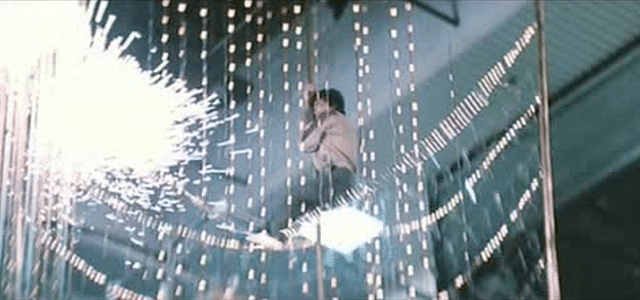
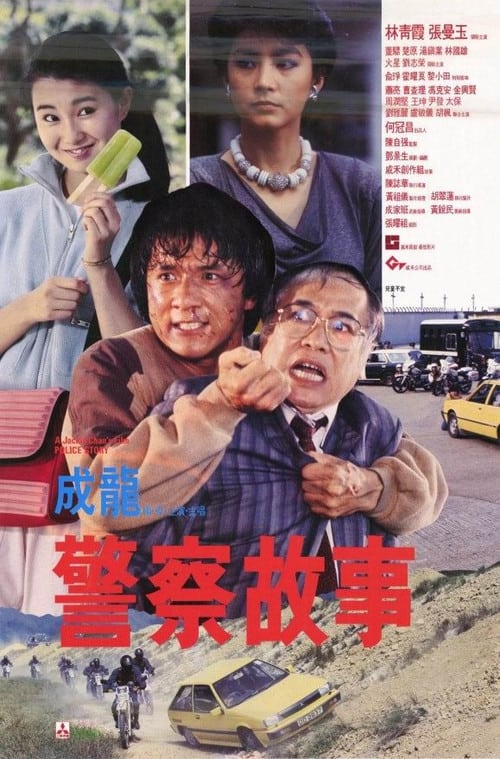
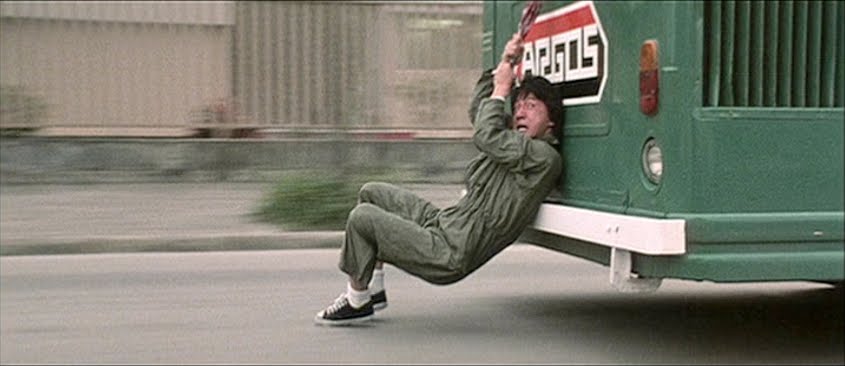
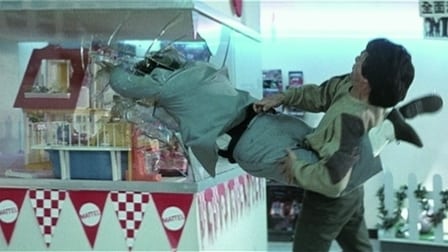


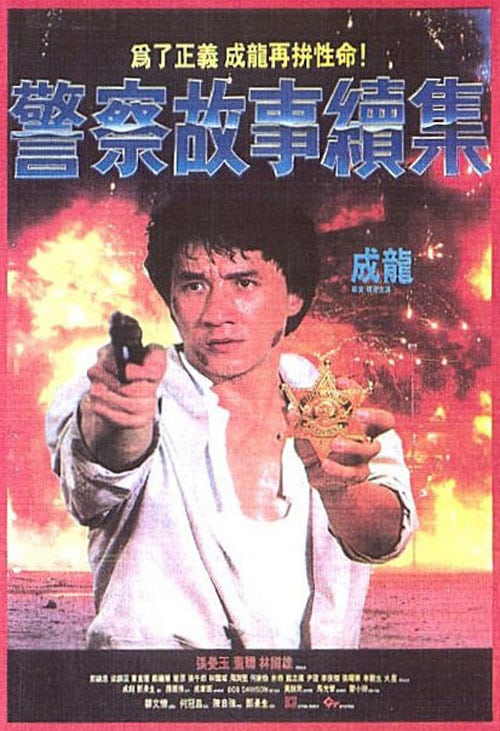
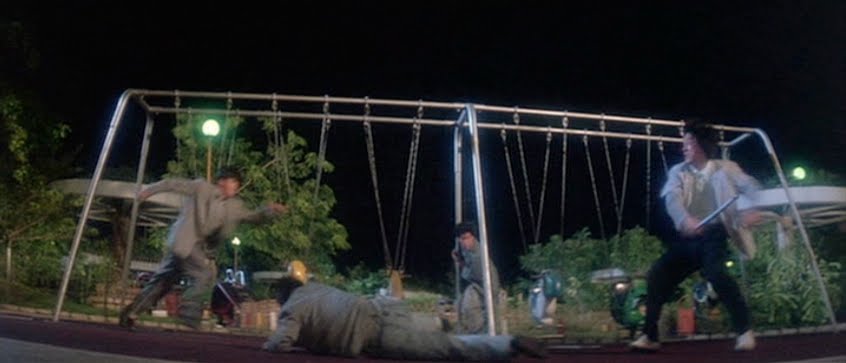
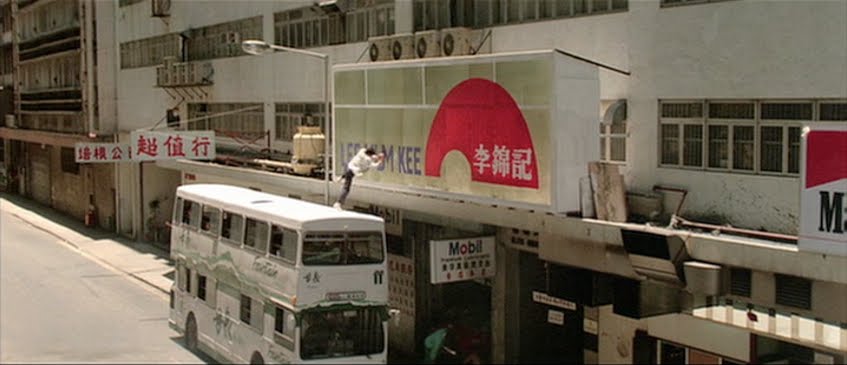

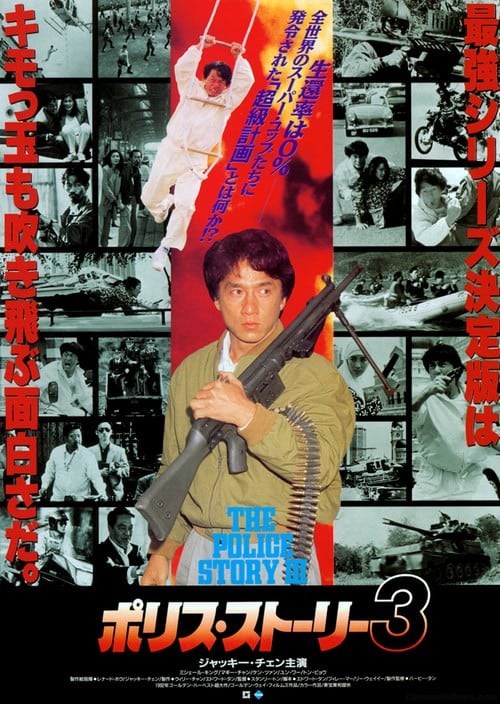
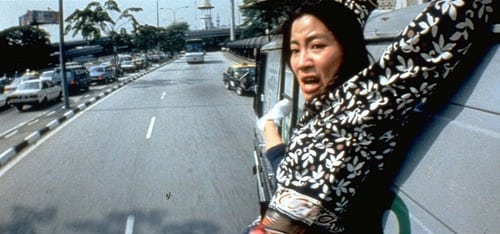
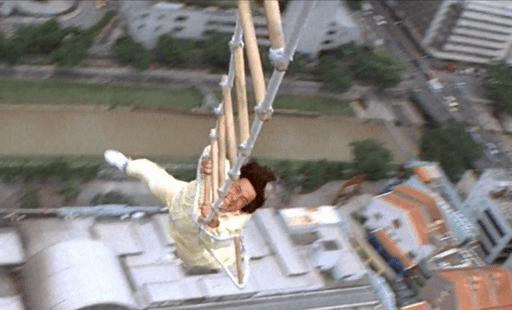
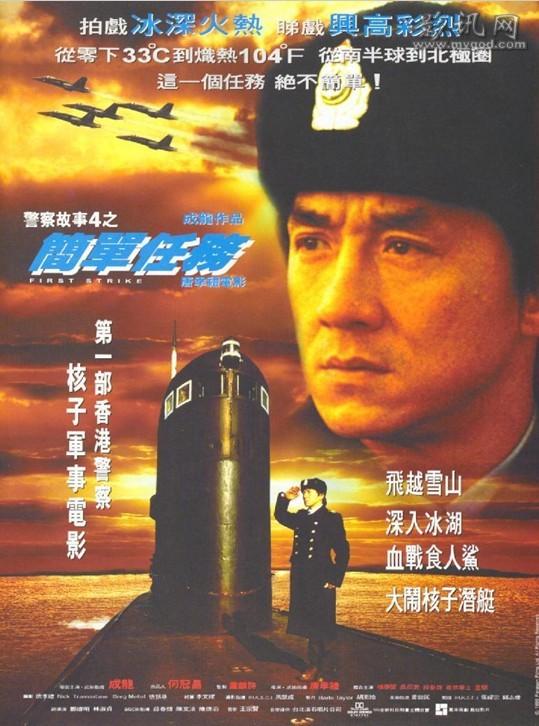
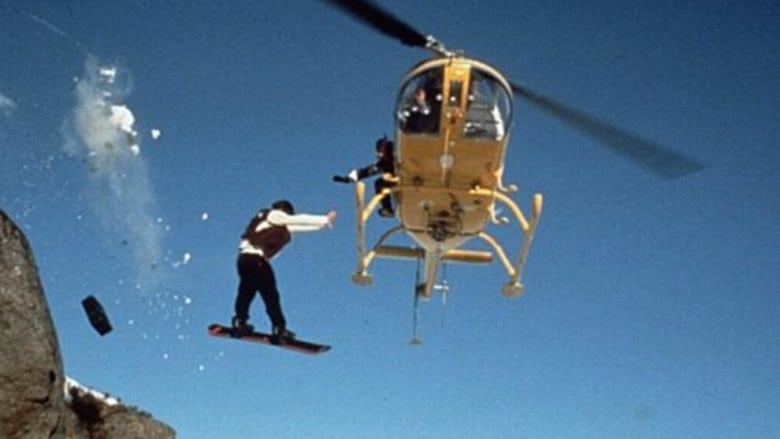
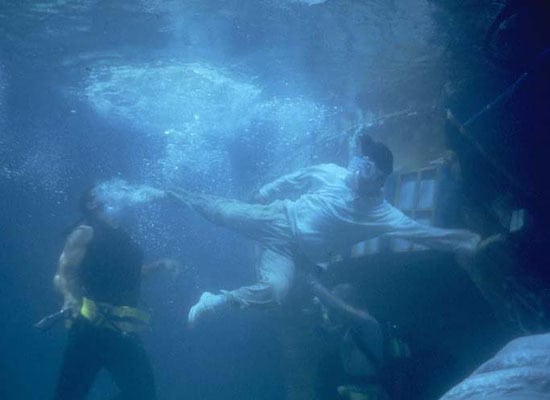
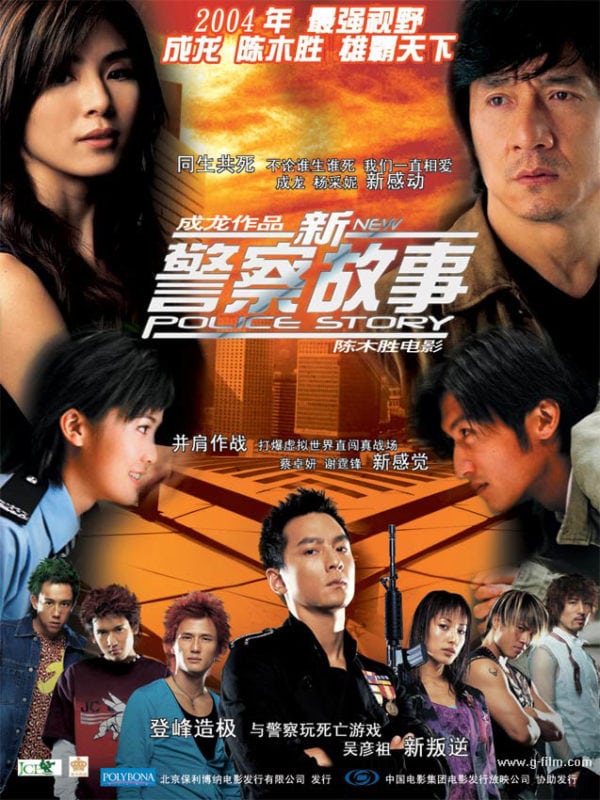
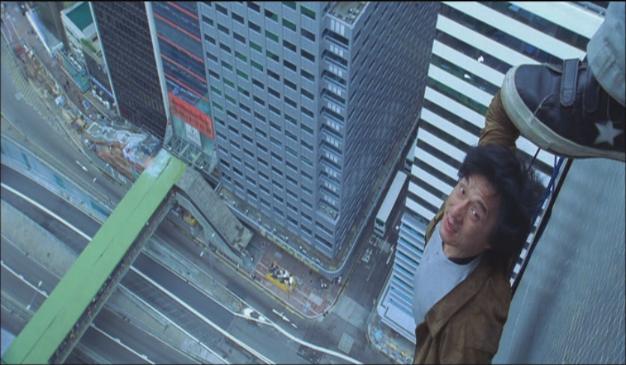
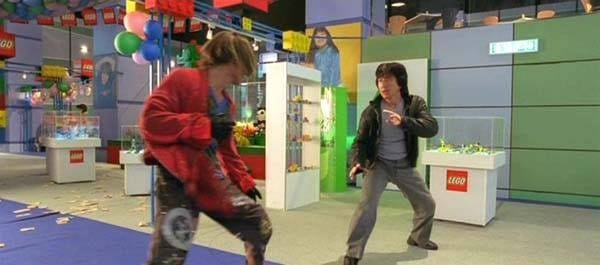

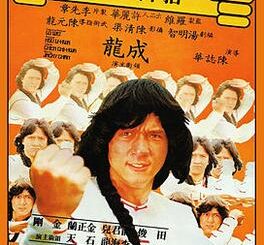
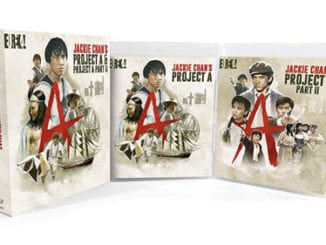
Be the first to comment